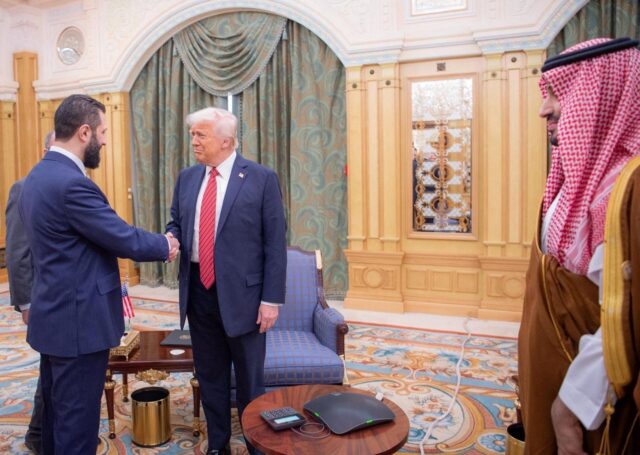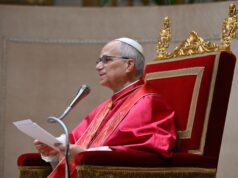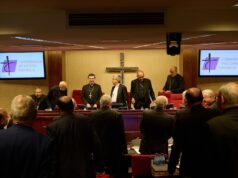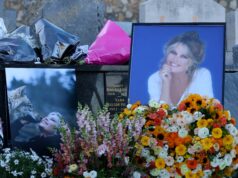
AMMAN, Jordan — Continued attacks on Christians and other minorities in Syria at the hands of Islamists, some affiliated with the new Syrian interim government, call into question whether the war-torn country can rebuild without first securing its people.
Hamza Shaheen, a respected Druze physician and community leader, abducted near Damascus by armed men at the end of October, was found dead a few days later after he was tortured, Syrian human rights advocates reported Nov. 6.
The Washington-based Save the Persecuted Christians organization asked President Donald Trump to press for a humanitarian corridor for the southern region of Sweida in talks with Syrian President Ahmed al-Sharaa at the White House on Nov. 10, marking the first-ever visit by a Syrian president there. Some 90% of aid being distributed through Damascus is not reaching Sweida, where Druze and Christian communities live, religious freedom advocates say.
Syrian Archbishop Jacques Mourad warned that the “church in Syria is dying,” as more Christians flee the ensuing sectarian violence in the aftermath of the Islamist takeover of the country Dec. 2024.
“The Syrian people continue to suffer violence, reprisals, and tragic and regrettable events that undermine all the international claims and popular demands to put an end to this bloodbath,” Archbishop Mourad told the pontifical charity Aid to the Church in Need on Oct. 30.
“People are under all sorts of pressure. Don’t think we are heading towards greater freedom, religious or otherwise,” said Archbishop Mourad, who heads the Syriac Catholic Archdiocese of Homs. He survived a kidnapping by Islamic State group militants during the 14-year civil war with help from Muslim friends as a result of good communal ties built at a monastery where he once served.
It’s believed that only some 540,000 Christians remain in Syria compared to 2.1 million Christians in 2011 at the start of the war, ACN estimates. Christians and others have lost hope in the new Sunni Muslim-led government of President al-Sharaa, a former al-Qaida leader.
“None of the efforts by the universal church or the local church managed to stem the tide of the exodus, because the causes are not related to the church, but rather to the country’s disastrous political and economic situation,” said Archbishop Mourad.
“You can’t stop a wave of migration without first establishing a well-defined political government model in Syria and a solid security system,” he warned.
Religious freedom advocates have pressed for increased security as violence has escalated against Christians, following recent massacres of the Druze in southern Sweida province and Alawites in coastal Latakia. Although al-Sharaa speaks of the inclusivity of Syria’s rich mosaic of communities, observers point to his failure to protect them or actively incorporate them into the new governance framework.
An uptick in killings, lootings, kidnappings and threats by attackers, some identifying themselves as “general security,” have reported recently in Syria’s Wadi al-Masihiyeen (Valley of Christians) in the central Homs countryside.
Patriarch John X, primate of the Greek Orthodox Patriarchate of Antioch and All The East, one of Syria’s most senior Christian clergymen, told a visiting President al-Sharaa that these incidents have largely neither been investigated nor punished by the government’s security forces. He urged for needed concrete measures to secure Christian areas in the Valley and throughout Syria.
Chorbishop Michel Naaman, vicar general of the Syriac Catholic Archdiocese of Homs, was robbed at gunpoint and injured by men who identified as “general security” outside his home Sept. 5 in an incident that “nearly cost him his life,” as reported by AsiaNews, an official press agency of the Pontifical Institute for Foreign Missions. Chorbishop is a rank of Christian clergy below bishop, especially in Eastern churches.
Lauren Homer, Middle East chair of the Washington-based International Religious Freedom Forum, who monitors events in Syria, decried the upsurge in violence.
“In recent weeks there have been targeted assassinations in the Valley of Christians because they refused the demands of gunmen to turn over their homes and businesses. Christians have been told: ‘You’re next. We’re going to drive you out. This is our territory,'” said Homer, an international lawyer, speaking to OSV News about the threats.
The forum addressed these concerns to the U.S. Secretary of State Marco Rubio on Oct. 15. The majority Druze of Sweida remain under siege. About 2,000 combatants and civilians were killed there in one of the deadliest outbursts of sectarian violence since al-Sharaa took power. Some 60 Christian family homes as well as churches in Sweida were also burned down.
Residents in Syria report the spread of hatred of minorities to youth through cartoons and visits to schools. It’s unclear who is behind these measures.
“To many Syrians, the massacre in Sweida made clear a pattern of government and pro-government forces targeting and killing Syrian minorities, with few repercussions,” a recent New York Times investigation found. “Little-checked bloodshed has led many Syrians to abandon hope that the years of brutality may be over,” NYT said, posting multiple videos of soldiers marching civilians to firing squads and doctors and religious leaders held at gunpoint in the hospitals.
“President al-Sharaa now faces two defining opportunities that Syria’s minorities are watching closely: the upcoming parliamentary appointments and the integration of the northeast,” Nadine Maenza, president of the Washington-based International Religious Freedom Secretariat, told OSV News.
“That model — where Kurds, Arabs, Christians and others share power — has delivered rare stability and social cohesion despite difficult circumstances. Undermining it would squander one of the few examples of effective, participatory governance in Syria today,” she said.
“Both moments will reveal whether the new government intends to build a Syria that belongs to all its people,” Maenza said.








